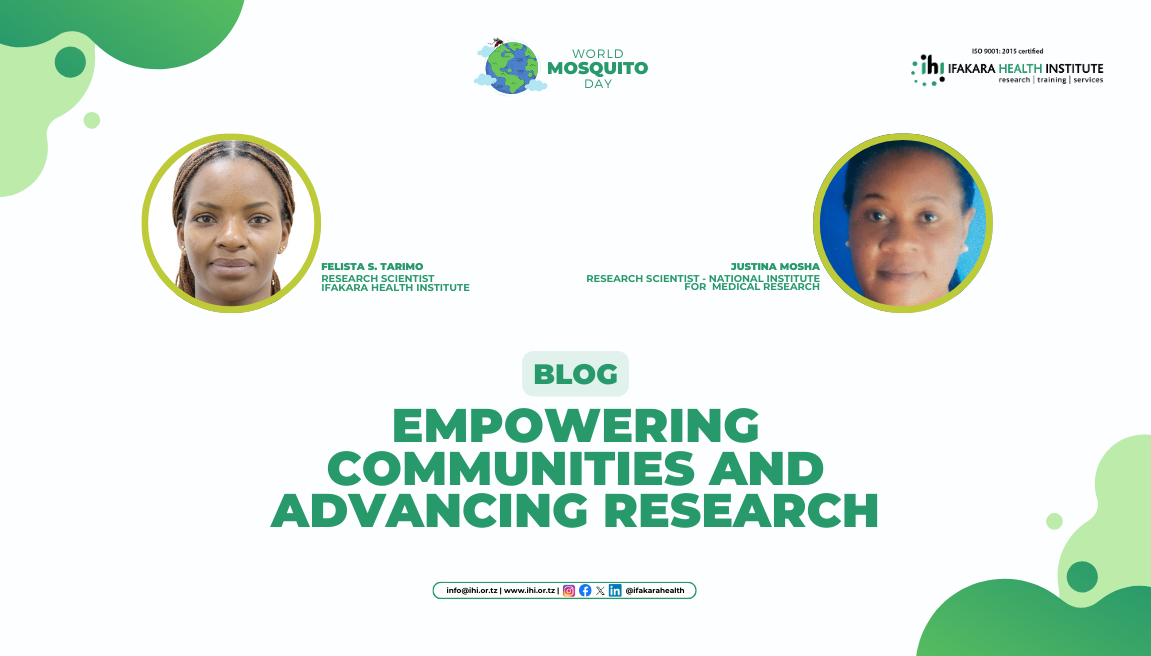
WORLD MOSQUITO DAY: Empowering communities, advancing research

>> Write Felista Tarimo & Justina Mosha
Mosquito-borne diseases are illnesses transmitted through the bites of infected mosquitoes. These diseases pose significant public health challenges worldwide. Among these diseases, malaria stands out as one of the most severe and widespread particularly in tropical and subtropical regions. Malaria is caused by the Plasmodium parasite, and is primarily transmitted by female Anopheles mosquitoes.
Raising awareness among communities about malaria and other mosquito-borne diseases remains crucial due to their significant impact on public health and social and economic development. Despite advancements in prevention and treatment, malaria still causes about 600,00 deaths each year, with 67% of these deaths occurring among children under five, particularly in Sub-Saharan Africa (WHO, 2022).
Awareness campaigns help educate communities about preventive measures such as using insecticide-treated bed nets, eliminating standing water that may serve as potential breeding habitats for mosquitoes, and seeking prompt medical care when malaria symptoms arise.
Additionally, among other factors, climate change has been linked to an increased risk of malaria transmission due to changing weather conditions, including prolonged rainy and hot seasons that enhance mosquito reproduction and survival, and the establishment of potentially invasive species such as Anopheles stephensi (WHO, 2023).
Innovative malaria control tools like gene drives could offer significant advantages in the fight against malaria by targeting the root causes – the parasite that causes the disease and the mosquito that carries the parasite. Gene drives work by spreading modified genes through mosquito populations more rapidly than would occur naturally, aiming to either render them incapable of transmitting the parasite, or reduce their numbers with Transmission zero’s focusing on the former approach. Gene drives could significantly reduce the burden of malaria by lowering transmission rates, particularly in regions with high endemicity.
Given the novelty of gene drive technology in malaria control, and ongoing research in malaria-affected countries like Tanzania, it is crucial to raise awareness in order to:
- Ensure transparency and build trust among all stakeholders by providing accurate and timely information, thereby preventing public misinformation.
- Understand and address stakeholders’ social and ethical concerns, particularly regarding the morality of modifying an organism’s genetic materials and the uncertainties about long-term ecological impacts.
- Equip stakeholders with the necessary information such as the evidence obtained from the research to make informed decisions.
- Gain public and or community acceptance and consent for research activities involving transgenic mosquitoes.
- Collaborating with journalists and media houses to maintain ongoing public engagement regarding the research progress.
As we commemorate World Mosquito Day, it’s important to remember that the fight against mosquito-borne diseases like malaria is far from over. While we have made significant progress in reducing the burden of malaria, the persistent threat of this disease requires continued vigilance, innovation, and collaboration. By raising awareness, and advancing research on innovative technologies like gene drives, we can empower communities, protect vulnerable populations, and move closer to a world free from malaria.
>> Both Felista Tarimo and Justina Mosha are research scientists working for the Ifakara Health Institute and the National Institute of Medical Research (Mwanza) respectively under the Transmission Zero program.
